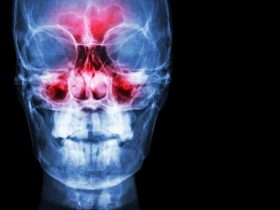At the 68th annual meeting of American Rhinologic Society (ARS), held from September 9, 2022, through September 10, 2022, in Philadelphia, PA, Dr. Lauren Roland from Washington University in St. Louis and Dr. Kent Lam from Eastern Virginia Medical School presented a panel discussion titled “What’s on the horizon? Biologics for nasal polyposis.” Chronic rhinosinusitis with nasal polyps (CRSwNP) is a type -2 inflammatory condition that affects the nasal mucosa and paranasal sinuses. Standard care, such as local and systemic corticosteroids and/or sinonasal surgery, may lead to recurrences, and patients may need revision surgery. Biologic agents that target key effectors of type 2 inflammation could be used as a supplement to treatment for people with severe and uncontrolled CRSwNP.
Interleukin (IL)-4, IL-5, IL-13, and thymic stromal lymphopoietin (TSLP) have all been extensively researched for their roles in controlling eosinophilic respiratory inflammation in CRSwNP. IL-5 is needed for eosinophils to live and become active. IL-4 and IL-13 are involved in fibrosis and remodeling, goblet cell hyperplasia, mucus production, and IgE class switching. TSLP can stimulate Th2 cytokine production in CRSwNP. Monoclonal antibodies to block the inflammation mediated by type II cytokines, cytokine receptors, and IgE have recently been approved for CRSwNP: Dupilumab (anti-IL-4 receptor alpha, 2019); Omalizumab (anti-IgE, 2020); and Mepolizumab (anti-IL-5, 2021). The speakers specifically introduced three other biologics currently in phase III trials.
Benralizumab (FASENRA, AstraZeneca) is a monoclonal antibody against the alpha-subunit of the IL-5 receptor. It is used to stop the effects of IL-5 and speed up the death of eosinophils. Benralizumab has been approved as an add-on treatment for severe asthma in patients aged 12 and up since November 2017. In 2022, the results of its first phase III trial for CRSwNP (OSTRO) were published: 413 adult patients who had failed previous standard care were randomly assigned to receive benralizumab 30 mg or placebo every four weeks for the first three doses and every eight weeks after that. Significant improvements were observed in nasal polyp score (NPS), nasal blockage score, sinonasal outcome test 22 (SNOT-22) score, and sense of smell score. A second phase III trial (ORCHID) is ongoing.
Depemokimab (GSK3511294) is a treatment under investigation for severe eosinophilic asthma, eosinophilic granulomatosis with polyangiitis, and nasal polyposis. Depemokimab provides long-acting suppression of IL-5 function by extending half-life and improving IL-5 affinity. Phase III trial ANCHOR is ongoing to assess the efficacy and safety of depemokimab in nasal polyposis
Tezepelumab (TEZSPIRE, AstraZeneca) is a monoclonal antibody targeting TLSP. It has been approved for the additional treatment of adult and pediatric patients with severe asthma since December 2021. A post-doc analysis of the phase 2b PATHWAY study found that tezepelumab cut asthma attacks, the number of eosinophils in the blood, and the levels of IL-5 and IL-13 in asthma patients with and without nasal polyps. Phase III trial (WAYPOINT) for CRSwNP is ongoing. “With three FDA-approved biologics and several others in clinical trials for CRSwNP, a new challenge awaits.” Finally, the speakers prospected that “Biomarker-based prognosis will be needed in the future to match biologic strategies to each patient.”




